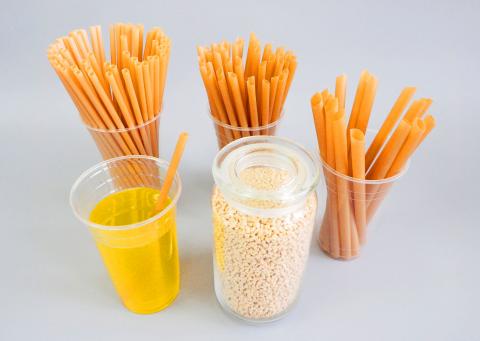Taiwanese start-up 100% Plants turns sugarcane byproducts into polymer raw materials that are used to make biodegradable straws, potentially opening new avenues for research into sustainable alternatives for plastic.
Simple chemical aggregation methods would be sufficient to render sugarcane by-products, or bagasse, into polymer raw materials, which could be used to manufacture biodegradable straws, 100% Plants founder Huang Chien-chung (黃千鐘) said on Friday.
Developing the processes was not without its challenges.

Photo: Chen Feng-li, Taipei Times
The first factory that they collaborated with complained that the materials were “unusable,” Huang said, adding that solutions necessitated modifying the factory’s machines.
After calibrations and tests, a product was produced that would not crack or splinter, even when subjected to temperatures of minus-20°C, Huang said.
The company is collaborating with National Taiwan Ocean University to determine the product’s rate of degradation when submerged in ocean water or in fish stomach acid, he said.
“We hope that the test results will prove that our product is environmentally friendly,” Huang said.
The Rural Development Foundation fully supports the start-up’s idea, foundation president Hsieh Chih-cheng (謝志誠) said, adding that using what would otherwise be considered agricultural waste as a substitute for polyethylene is practical and eco-friendly.
The start-up is researching using discarded bamboo to manufacture one-time utensils, with a prototype undergoing tests in the US and Australia, he said.
The company’s efforts have attracted the attention of several French tourist destinations, as France’s Energy Transition for Green Growth Act intends to ban plastic plates, cups and utensils by 2020, he added.
The start-up is in talks with the localities regarding the possibility of turning grape bagasse and barley pulp into useful products, Huang said.
The start-up has refused offers from more than 20 Chinese companies over the past two months wishing to buy its technology, he said.
“We do want to make money, but we give an even higher priority to working with the international community as a Taiwanese company,” Huang added.

A strong continental cold air mass is to bring pollutants to Taiwan from tomorrow, the Ministry of Environment said today, as it issued an “orange” air quality alert for most of the country. All of Taiwan except for Hualien and Taitung counties is to be under an “orange” air quality alert tomorrow, indicating air quality that is unhealthy for sensitive groups. In China, areas from Shandong to Shanghai have been enveloped in haze since Saturday, the ministry said in a news release. Yesterday, hourly concentrations of PM2.5 in these areas ranged from 65 to 160 micrograms per cubic meter (mg/m³), and pollutants were

Taiwan’s armed forces have established response protocols for a wide range of sudden contingencies, including the “Wan Chun Plan” to protect the head of state, the Ministry of Defense (MND) said today. After US President Donald Trump on Saturday launched a series of airstrikes in Venezuela and kidnapped Venezuelan President Nicolas Maduro, concerns have been raised as to whether China would launch a similar “decapitation strike” on Taiwan. The armed forces regularly coordinate with relevant agencies and practice drills to ensure preparedness for a wide range of scenarios, Vice Minister of National Defense Hsu Szu-chien (徐斯儉) told reporters before a

EVA Airways on Saturday said that it had suspended a pilot and opened an investigation after he allegedly lost his temper and punched the first officer several times as their plane was taxiing before takeoff at Los Angeles International Airport. According to a report published on Thursday by The Reporter, the incident occurred after the flight’s Malaysian first officer tried to warn the Taiwanese pilot, surnamed Wen (文), that he was taxiing faster than the speed limit of 30 knots (55.6kph). After alerting the pilot several times without response, the first officer manually applied the brakes in accordance with standard operating

NOT AN OPENING: Trump’s violation of international law does not affect China’s consideration in attacking Taiwan; Beijing lacks capability, not precedent, an official said Taiwanese officials see the US’ capture of the president of Venezuela as a powerful deterrent to Beijing’s aggression and a timely reminder of the US’ ability to defeat militaries equipped with Chinese-made weapons. The strikes that toppled Venezuelan President Nicolas Maduro signaled to authoritarian leaders, including Chinese President Xi Jinping (習近平), US President Donald Trump’s willingness to use military might for international affairs core to US interests, one senior official in Taipei’s security circle said. That reassured Taiwan, the person said. Taipei has also dismissed the idea that Trump’s apparent violation of international law could embolden Beijing, said the official, who was not